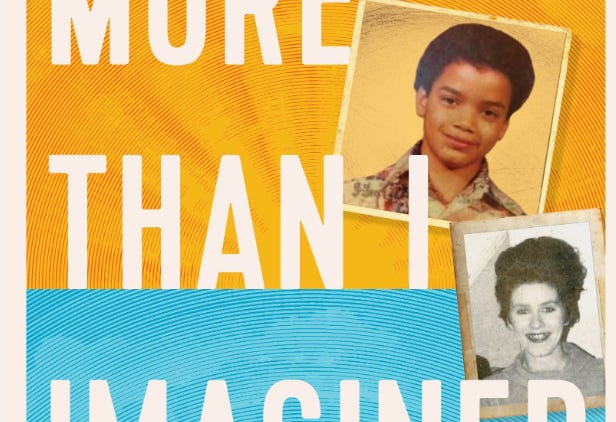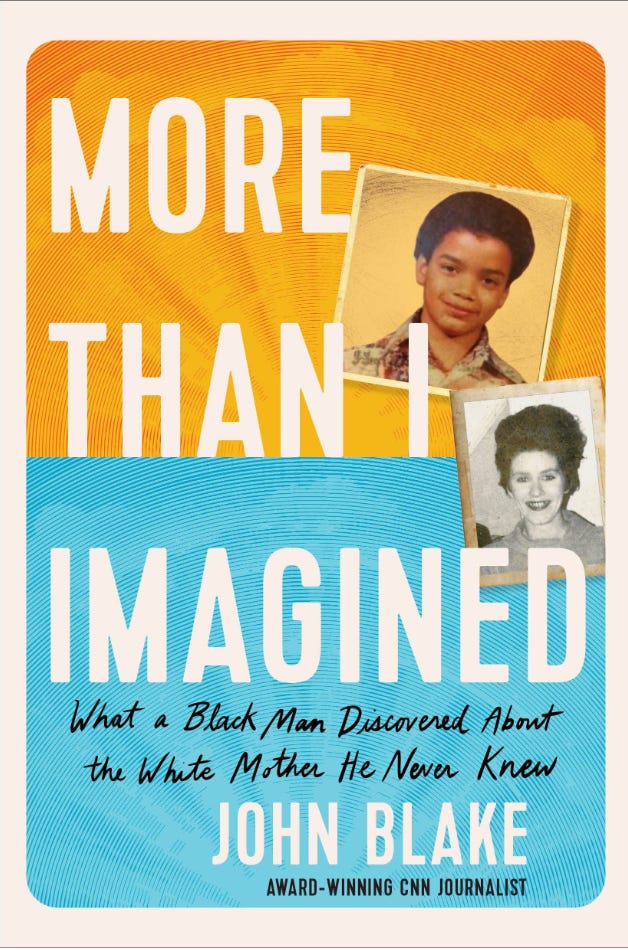More Than I Imagined
Not all memoirs are alike. Of course, you might say, no two persons are alike. Ever read evangelical conversion stories? Or Roman Catholic conversion narratives? Some memoirs are nearly identical. Different names, ages, locations, families – but the narrative is on repeat.
One memoir-like book that is so unlike any other I’ve read is by John Blake’s, and it is called More Than I Imagined: What a Black Man Discovered about the White Mother He Never Knew. Some of you may read Blake’s columns at CNN, who has over the years written especially about how poverty intertwines with race and religion. He’s bi-racial so the interlacing of the themes are his specialty. He’s more than good at his craft.
He's got more than one story to tell.
Lots of memoirs move along chronologically. That decision often creates potholes that have to be covered and side trips that deserve to be told. But Blake does not follow, at least not strictly, a chronological narrative. Instead, the genius of this book is that Blake takes us through one relationship after another that clarify his personality and passions and gifts, his growth – intellectually and spiritually and relationally – and his professional career. I don’t recall a memoir so substantively shaped by the self-awareness of one’s relationships.
Blake grew up in West Baltimore, which for this Chicagolander, sounds like West Garfield Park in Chicago. His father was often gone for months at sea. At times he and his brother, Pat, were in foster homes. Blake was intelligent, he was a tennis player, he went to Howard University, and after horsing around enough to wonder if he was going to make it, he became a disciplined student and his career took off as a journalist.
But this is a narrative about his African American father, who was often absent and not exactly the most exemplary of models, and his mother, who was white, absent, and no one would tell him about her. As Blake writes, “My friends thought I had the coolest father, but I needed something more from him that he refused to give. I can't think of anyone who was more spectacularly ill-equipped to answer the two questions that preoccupied me from the beginning: “Where is my mother?” and “What is my place in the world?” If my father was “wild and windblown,” my mother was a phantom. I had no memory of her, and neither did Pat, who is less than a year younger than I am.”
Blake's story is about the shame he had because he had a white mother. About the anger he felt toward white folks. It is about the challenges of growing up in West Baltimore. Again, “My solution: I became a closeted biracial person. I pretended the white side of my identity didn't exist. I wouldn't tell anyone that my mother was white. I was too ashamed. It was a secret that I kept from even my closest friends. I pretended that my mother was black and marked it as such on school forms. I even stopped including my middle name – Kennedy -- in my signature. I was named after the nation's first Irish Catholic president, in honor of my mother's Irish heritage, but I wanted no reminder of that side of me.”
It is about the discovery of who his mother was, her mental illness, which aggravated his shame, but it is also a redemptive story about coming to love, honor, and reconcile with his mother.
It is a story about coming to faith, as well as embodying that faith. A generous faith that he learned from his Aunt Sylvia, a woman who in many ways saved his life. (But, I add, he learned faith, too, from a college friend who introduced him to Bible study and conversations. And from a pastor named “Nibs.”) I don't want to say much about her because I found this to be a wonderful relational narrative in this book. You'll have to read it to experience it. Even more, I won't describe how he discovered his mother and her sister and their faither, and how those relationships formed. You will have to read it to believe them, and you can read about his marriage to Terrylynn. And there’s an amazing, gripping story about a presence at times in his bedroom. Wow!
I often read memoirs, not only to learn about the stories of others, but also to find stories for books, for sermons, and for lectures in classes. The most recent two memoirs that I have read, Jon Ward's Testimony and John Blake's More Than I Imagined, have not only provided grist for story-telling but they have been exceptionally well-written narratives that have made me want to get to know both of these authors.
More than a dozen times, as I was reading this book, I put it down and either muttered or said aloud, Wow! Most of the time John Blake is telling a story for us, not telling a story to us. At times, he steps out of that narrative mold to preach a little, but the stories do all the work in this book.
It's a story about racism transcended and, as Blake frames it over and over in this book, “facts don’t change people; relationships do.” It was in getting to know different members of his family, and then eventually his mother and her family, that broke down some of Blake's racism and allowed him to transcend it with love in a relationship.
Integration, he claims, can be reworked into a workable relational theory.
Sitting at his mother’s funeral, he mused: “When I was a child, I was ashamed of my mother because she was white. When I was a young man, I was ashamed of her because she had a mental illness. But now sitting next to Pat, I felt something I'd never really felt before – pride. Pride over the fact that I was her son.”




I am moving from reading this to getting the book. Thanks, again.
I’ve been reading this book too and learned a lot. Also have two older bi racial daughters who we adopted as teens when their mom died. So it was helpful to read this through that experience and get more understanding of how they felt about some things